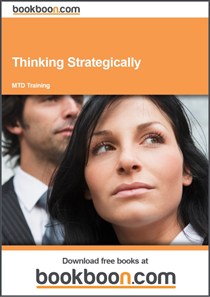You cannot build a reputation on what you are going to do. Henry Ford
Get your brain in motion
If you want to reach your goals it is necessary to formulate a strategy. You need a top-level overview of your organization to do your best and motivate your team.
“Thinking strategically“, a free ebook that you can download at Bookboon.com, provides useful suggestions in order to help simplify your work.
In this book, Dr. Chris Peterson, Professor at Michigan State University, provides a list of what he calls the six P’s of thinking strategically:
1. Plan – action that you have consciously intended
2. Ploy – What you will do to out-do the competition
3. Pattern – Establishing success as a consistent event over time
4. Position – Creating and holding a market presence
5. Purpose – Direction as a collective group
6. Push – Goals that stretch the organization – push them outside the existing comfort zone of performance

Bookboon provides a collection of valuable free ebooks for professionals.
The subject of the Diplocalendar 2012 for the month of September is Multitasking.
The opposite of delegation, multitasking is an attempt to divide your mind and attention into several activities that you attempt to do all at once. Few people learn to do this successfully; in general it’s a recipe for failure.
More inspiring subjects on Diplocalendar 2012 that explores in both a serious and lighthearted way, some elements of interpersonal relationships and management that can help in daily activities.
Diplomatic activities involves many jobs in one. This illustration by Diplofoundation summarizes the four different kind of working situation that any diplomat can face during the career. Each one of them requires different skills and it is a job on its own. Appropriate training and experience is needed to perform adequately and take the right decisions.
The use of email and Internet is now part of any daily activity. Nevertheless there are common sense rules and best practices that are not always respected. The mind map elaborated by Diplofoundation provides a summary that can help improving the use of IT in the office.
The illustration has been realized by Diplofoundation and is based on a booklet titled “Appropriate Use: Guidelines and Best Practices for E-mail and Other Internet Services”
Everything should be made as simple as possible and not simpler, Albert Einstein
Michael W. Fordyce (leading researcher in happiness) in his work “Psychology of Happiness,” has elaborated the following 14 points to follow to find happiness:
1) Be more active and keep busy
2) Spend more time socializing
3) Be productive at meaningful work
4) Get better organized and plan things out
5) Stop worrying
6) Lower your expectations and aspirations
7) Develop positive, optimistic thinking
8) Get present oriented
9) Work on a healthy personality
10) Develop an ongoing, social personality
11) Be yourself
12) Eliminate negative feelings and problems
13) Close relationships, #1 source of happiness
14) Place happiness as first priority
 Image source: http://favim.com/image/38251/
Image source: http://favim.com/image/38251/
Thinking skills are applicable in any branch of life. If used skillfully, they can help you perform better in your job, better in your team and better in your organization.
Bookboon provides a collection of valuable free ebooks for Professionals. “Thinking Skills” is one of these books and provides useful suggestions to improve these skills.
The book can be freely downloaded from the Web at:
The word NO is a great time saver. Say NO to anything that is not the highest and best use of your time. Brian Tracey.
Source image: The New Yorker
© 2025 Diplo Learning Corner
Theme by Anders Noren — Up ↑
Recent Comments